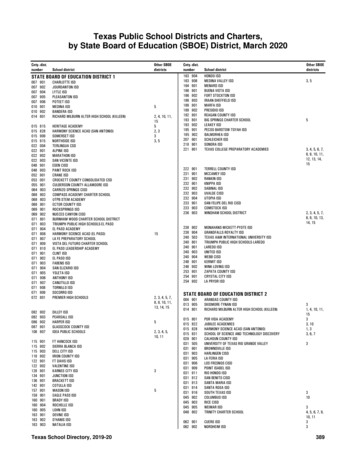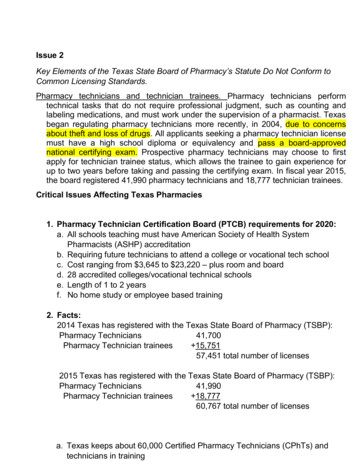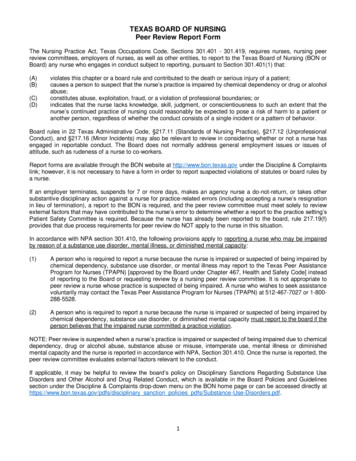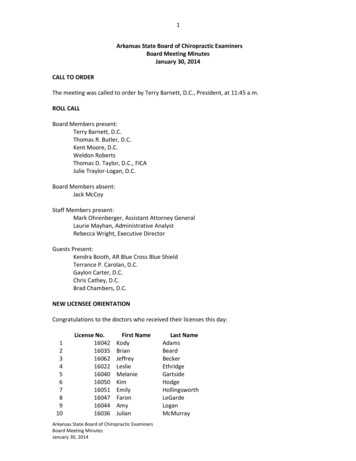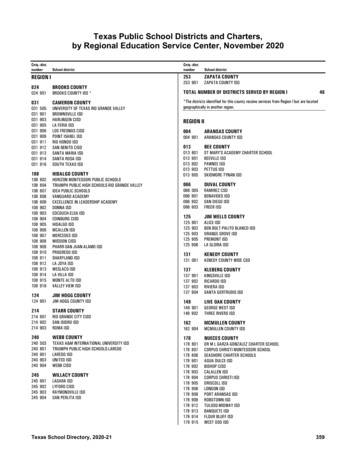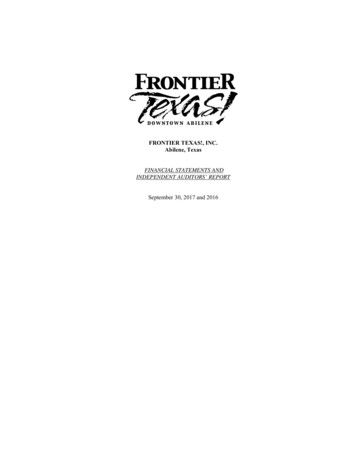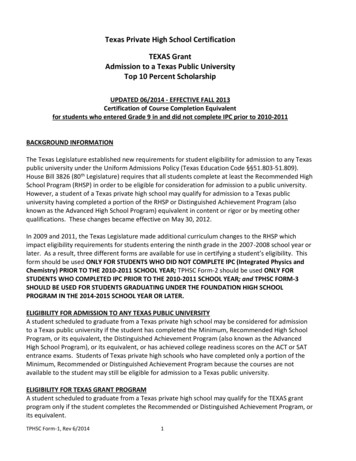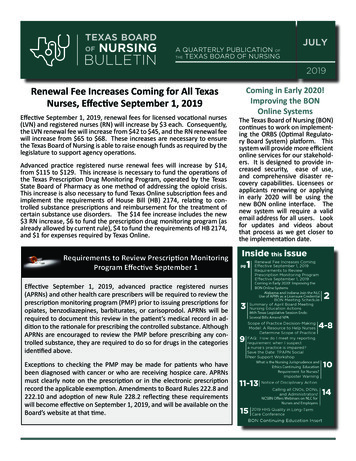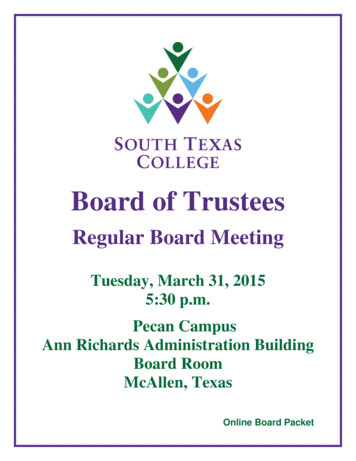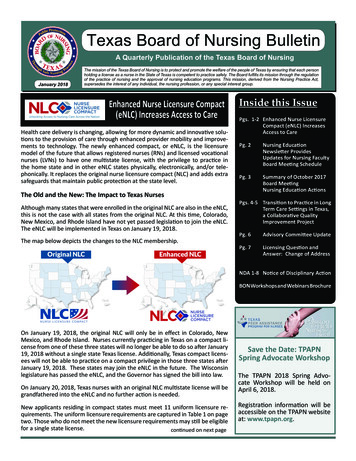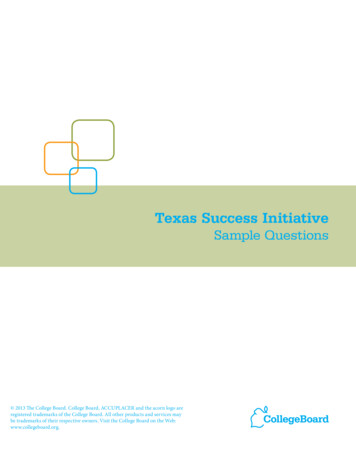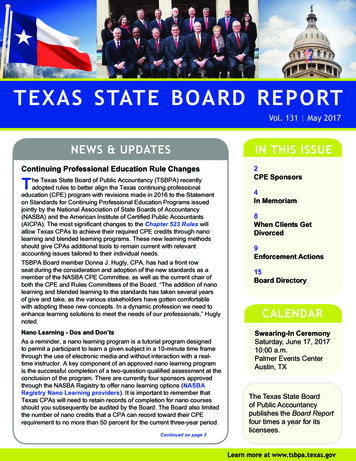
Transcription
TEXAS STATE BOARD REPORTVol. 131 May 2017NEWS & UPDATESContinuing Professional Education Rule ChangesThe Texas State Board of Public Accountancy (TSBPA) recentlyadopted rules to better align the Texas continuing professionaleducation (CPE) program with revisions made in 2016 to the Statementon Standards for Continuing Professional Education Programs issuedjointly by the National Association of State Boards of Accountancy(NASBA) and the American Institute of Certified Public Accountants(AICPA). The most significant changes to the Chapter 523 Rules willallow Texas CPAs to achieve their required CPE credits through nanolearning and blended learning programs. These new learning methodsshould give CPAs additional tools to remain current with relevantaccounting issues tailored to their individual needs.TSBPA Board member Donna J. Hugly, CPA, has had a front rowseat during the consideration and adoption of the new standards as amember of the NASBA CPE Committee, as well as the current chair ofboth the CPE and Rules Committees of the Board. “The addition of nanolearning and blended learning to the standards has taken several yearsof give and take, as the various stakeholders have gotten comfortablewith adopting these new concepts. In a dynamic profession we need toenhance learning solutions to meet the needs of our professionals,” Huglynoted.Nano Learning - Dos and Don’tsAs a reminder, a nano learning program is a tutorial program designedto permit a participant to learn a given subject in a 10-minute time framethrough the use of electronic media and without interaction with a realtime instructor. A key component of an approved nano learning programis the successful completion of a two-question qualified assessment at theconclusion of the program. There are currently four sponsors approvedthrough the NASBA Registry to offer nano learning options (NASBARegistry Nano Learning providers). It is important to remember thatTexas CPAs will need to retain records of completion for nano coursesshould you subsequently be audited by the Board. The Board also limitedthe number of nano credits that a CPA can record toward their CPErequirement to no more than 50 percent for the current three-year period.Continued on page 3IN THIS ISSUE2CPE Sponsors4In Memoriam8When Clients GetDivorced9Enforcement Actions15Board DirectoryCALENDARSwearing-In CeremonySaturday, June 17, 201710:00 a.m.Palmer Events CenterAustin, TXThe Texas State Boardof Public Accountancypublishes the Board Reportfour times a year for itslicensees.Learn more at www.tsbpa.texas.gov
CONTINUING PROFESSIONAL EDUCATION (CPE) SPONSORSSUCCESSFULLY COMPLETING REVIEW (as of April 21, 2017)Sponsor #Sponsor NameDate of Next ReviewTEXAS STATE BOARD OFPUBLIC ACCOUNTANCYStatus333 GuadalupeTower 3, Suite 900Austin, TX 78701-3900010248 Direct Energy, L.P. TaxDepartment03/01/2019 - 02/29/2020A010238 Ellivate Advisors, LLC01/01/2019 - 12/31/2019EBOARD MEMBERS005555 Ericsson, Inc.04/01/2019 - 03/31/2020A008652 Heartspring Methodist Foundation02/01/2019 - 01/31/2020AJ. Coalter Baker, CPAPresiding Officer000545 Institute of ManagementAccountants02/01/2019 - 01/31/2020A007252 KHA Accountants, PLLC03/01/2019 - 02/29/2020A004959 Myatt, Blume, and Osburn,LTD., LLP01/01/2019 - 12/31/2019A000557 Sproles Woodard, LLP02/01/2019 - 01/31/2020A000385 Texas Society of CPAs El Paso Chapter01/01/2019 - 12/31/2019A002013 Texas State Agency BusinessAdministrators Association02/01/2019 - 01/31/2020A009971 Texas Wesleyan University01/01/2019 - 12/31/2019A009273 Third Wednesday PracticeManagement Group01/01/2019 - 12/31/2019ARegistration Status: A Currently active E Currently expired Check the Board website at www.tsbpa.texas.gov for qualified CPE sponsors beforeenrolling in a CPE course. Donna J. Hugly, CPAAssistant Presiding OfficerRobert M. (Bob) McAdams, CPATreasurerSteve D. Peña, CPASecretaryRocky L. Duckworth, CPAExecutive Member-at-LargeWilliam (Bill) LawrenceExecutive Member-at-LargeJohn R. Broaddus, CPAJonathan B. Cluck, Esq.Susan FletcherRoss T. Johnson, CPATimothy L. (Tim) LaFrey, Esq., CPARoselyn (Rosie) Morris, Ph.D., CPABenjamin (Ben) Peña, CFE, CPAKimberly E. Wilkerson, Esq.Phillip W. (Phil) WorleyExecutive DirectorWilliam TreacyEditorJulie PrienAccounting/Administration(512) 305-7800FAX (512) 305-7854accounting@tsbpa.texas.govCPE(512) 305-7844FAX (512) 305-7875licensing@tsbpa.texas.govEnforcement(512) 305-7866FAX (512) 305-7854enforcement@tsbpa.texas.govExecutive Director(512) 305-7800FAX (512) 305-7854executive@tsbpa.texas.govThe Texas Society of CPAs is always looking for qualified peerreviewers with experience in accounting and auditing engagements.To learn more about becoming a qualified peer reviewer, visit the PeerReview section of tscpa.org (under the “Resource Center” tab) orcontact Jerry Cross, CPA, Director of Peer Review (jcross@tscpa.netor 972-687-8617).2 Licensing/Peer Review(512) 305-7853FAX (512) 305-7875licensing@tsbpa.texas.govPublications(512) 305-7804FAX (512) 12) 305-7851FAX (512) 305-7875exam@tsbpa.texas.gov
NEWS & UPDATES -CONTINUED-Nano Learning – Dos-Take course content from a Texas registeredsponsor or an approved NASBA Registry NanoLearning Sponsor-Retain your completion records-Record each course through online licensing-Each course is counted as 0.2 creditsThe revised rules include the addition of blendedlearning programs that combine multiple learningformats within a single course offering. The varieddelivery methods include group live, group Internetbased, self-study, or nano learning as part of a broaderlearning objective. Course offerings from registeredsponsors should clearly indicate when a blendedlearning approach is used.Other Rule Changes of NoteThe basic requirements for CPE remained largelyunchanged during this review cycle. Most Texas CPAsare still required to complete: 120 credits in the most recent three-year reportingperiod, a minimum of 20 credits in the current reportingperiod, and a four hour Board approved Texas ethics course everyother year.One revision that might take some time to incorporateinto your everyday CPE language is the change from“credit hours” to simply using the term “credits.”CPE exemptions are authorized in Section 901.411(d)of the Act and are available to CPAs that meet variousdefinitions in Rule §523.113. Specific language wasadded to prohibit an actively licensed Texas CPAfrom being exempt from the CPE requirements whileproviding instruction in an accounting course.The basic definitions of technical and non-technicalcourses remain unchanged and continue to rely on theCPAs determination as to the benefit to the licensee ortheir employer. Specific topics added to the rule in thetechnical area include courses in economics, finance,information technology, and regulatory ethics. Thenon-technical area added courses in computer softwareand applications, behavioral ethics, and businessmanagement and organization. The new rules in thissection are intended to dovetail with the NASBA Fieldsof Study document used in other jurisdictions.Use Online Services to Keep Your CPERecords Up To DateModifications to allow nano learning and blendedlearning as new methods are available in the drop-downNano Learning – Don’ts-Don’t claim credit from an unregistered sponsor-Don’t claim credit for watching stand-alone TedTalks or YouTube videos-If there is no assessment at the end, you did nottake a nano learning course-Don’t claim CPE credit for reading news and tradearticlesmenus through the “Report your CPE” link after youaccess your account via Online Services on the Board’swebsite. CPE courses can be added as you completethem so that you have an accurate view of credits thatremain to be completed ahead of your due date.Sponsor Review ProgramThe TSBPA Sponsor Review Program (SRP) ensuresthe availability of high-quality CPE for Texas CPAs.Since 2005, the program has been reviewing coursesoffered by Board-approved sponsors to make sure thattheir content is acceptable and that the instructors arequalified. The requirements for the SRP program beginsin §523.140 of the Texas CPE Rules.It is important for Texas CPAs to choose CPE coursesoffered by registered sponsors, either by the Board orthrough the NASBA Registry. Because approved CPEsponsors meet the standards of the Board, CPAs canhave confidence that the courses will be accepted fortheir licensure requirements. Courses taken from a nonregistered sponsor are limited to the number of creditsCPAs can claim (see Rule §523.119) and there is a riskof those credits being denied.CPE AuditsIn 2016, the Board’s CPE Committee wanted moreregular CPE audits to occur and to assure that licenseeswere complying with Board Rule §523.111(b), whichrequires licensees to retain evidence of participation forthe five most recent reporting periods. A small sampleof randomly selected Texas CPAs are being contactedeach quarter by Board staff to provide proof of CPEcourse completion in support of their most recent120-credit requirement. Nobody likes to be audited,especially auditors! So far the response from licenseesthat have been selected has been timely and hopefully,relatively painless. The CPE Committee anticipatescontinuing this practice through 2019, so please keepyour records up to date and available should you getselected in the future.Take a few minutes to review the revised Texas CPERules and take advantage of the new learning methodsavailable for your use.Learn more at www.tsbpa.texas.gov 3
Stuckin the MiddleWith YouWhen ClientsGet DivorcedIn 2014, 71,988 married couples in Texas parted ways, according to data from the Texas Departmentof State Health Services. The Texas State Board of Public Accountancy frequently receives complaintsabout certified public accountants (CPAs) that have gotten caught in the crossfire of divorced couples.Luckily, there are several steps you can take to prevent this from happening to you.First, determine who the client is. Is it the husband, the wife, or both? When preparing a joint tax return, bothspouses are clients. This is regardless of your interaction time, or lack thereof, with each. This means bothclients are entitled to copies of joint tax returns. When e-filing an income tax return, make sure both spousessign the Form 8879 and retain copies of the signed forms, regardless of your relationship with the couple.A written engagement letter spelling out the work to be performed, and signed by all parties, will leteveryone know what work is to be done and for whom. If the spouses are existing clients, but you continuerepresenting only one of the spouses, you should clearly withdraw from any engagement with the other.Receive written permission from the disengaged spouse to continue working with the client spouse. If youcontinue to work with both, disclose any potential conflicts of interest in writing to both parties, as conflictsarise, and get written consent from both before performing additional services. In some instances, it may bemore advantageous to stop working with the couple entirely and refer each of them to a different CPA.Entities, such as partnerships and corporations, are often involved in family businesses. If your client isa business entity, have the client designate the authorized representative. A clear statement listing theauthorized representative(s) will be useful for reference, if conflicts arise later and you are asked forinformation.You may feel very comfortable with your client(s); however, no one anticipates a divorce. By preparing forunfortunate circumstances you can safeguard yourself from having to respond to client complaints receivedby the Board’s enforcement division.8
ENFORCEMENT ACTIONSRatified at the Janaury 19, 2017 Board MeetingA. AGREED CONSENTORDERSBEHAVIORALENFORCEMENTCOMMITTEE1. Investigation No.: 11-08-07LRespondent: DonaldWarren DavisHometown: Irving, TXCertificate No.: 006435Rule Violations: 501.73,501.90(10), 501.93Act Violations: 901.502(6),901.502(11)After numerous continuances,Respondent, although properlynotified, failed to appear in personand was not represented at ascheduled public hearing. Followingthe scheduled public hearing, anAdministrative Law Judge (ALJ) ofthe State Office of AdministrativeHearings (SOAH) entered a defaultjudgment, and remanded the caseto the Board for informal dispositionunder Texas Government Code§ 2001.056. The Board approvedstaff’s recommendation thatRespondent’s certificate be revoked,Respondent be assessed 20,000in administrative costs, as well as alldirect administrative costs incurredin this matter.Respondent had power of attorneyfor his mother and managed herfinancial affairs. Respondentbreached his fiduciary duty tohis mother and engaged in afiscally dishonest act when hecomingled between 400,000 and 500,000 of her money with hisown. Respondent failed to timelyrespond to Board communicationsand repeatedly failed to respond toclients in a separate complaint.2. Investigation No.: 10-04-10LRespondent: Gerald Lee JonesHometown: Houston, TXCertificate No.: 045640Respondent entered into an agreedconsent order (ACO) with the Boardwhereby Respondent’s certificatewas conditionally reinstated. Thescope of Applicant’s practice islimited. Applicant shall not performany attest services including audits,reviews, compilations, forecasts,projections, or other specialreports until given permission bythe Board to resume this practice.In addition, for a period of threeyears from the date his certificateis reinstated, Applicant is placed onprobated revocation. Respondentmust complete four hours of livecontinuing professional education(CPE) in the area of ethics annuallyduring the probationary period andRespondent shall not provide anyassurances on any documentsto be used for extending creditto or from third parties until givenpermission by the Board to resumethis practice.The Board accepted Respondent’sinvoluntary surrender of hiscertificate after he pleaded
Texas CPAs will need to retain records of completion for nano courses should you subsequently be audited by the Board. The Board also limited the number of nano credits that a CPA can record toward their CPE requirement to no more than 50 percent for the current three-year period. Learn more at www.tsbpa.texas.gov The Texas State Board of Public Accountancy publishes the Board Report four .
